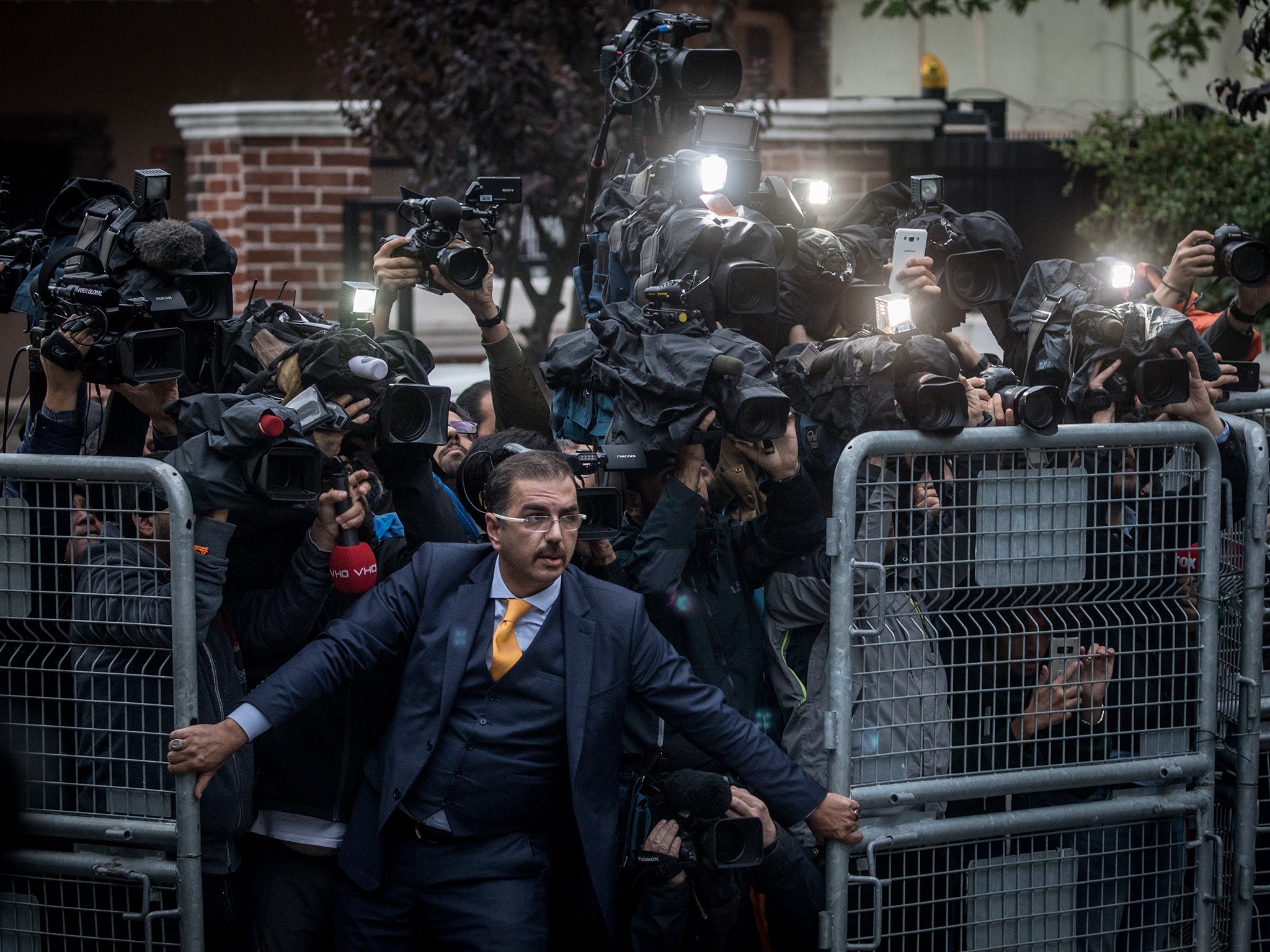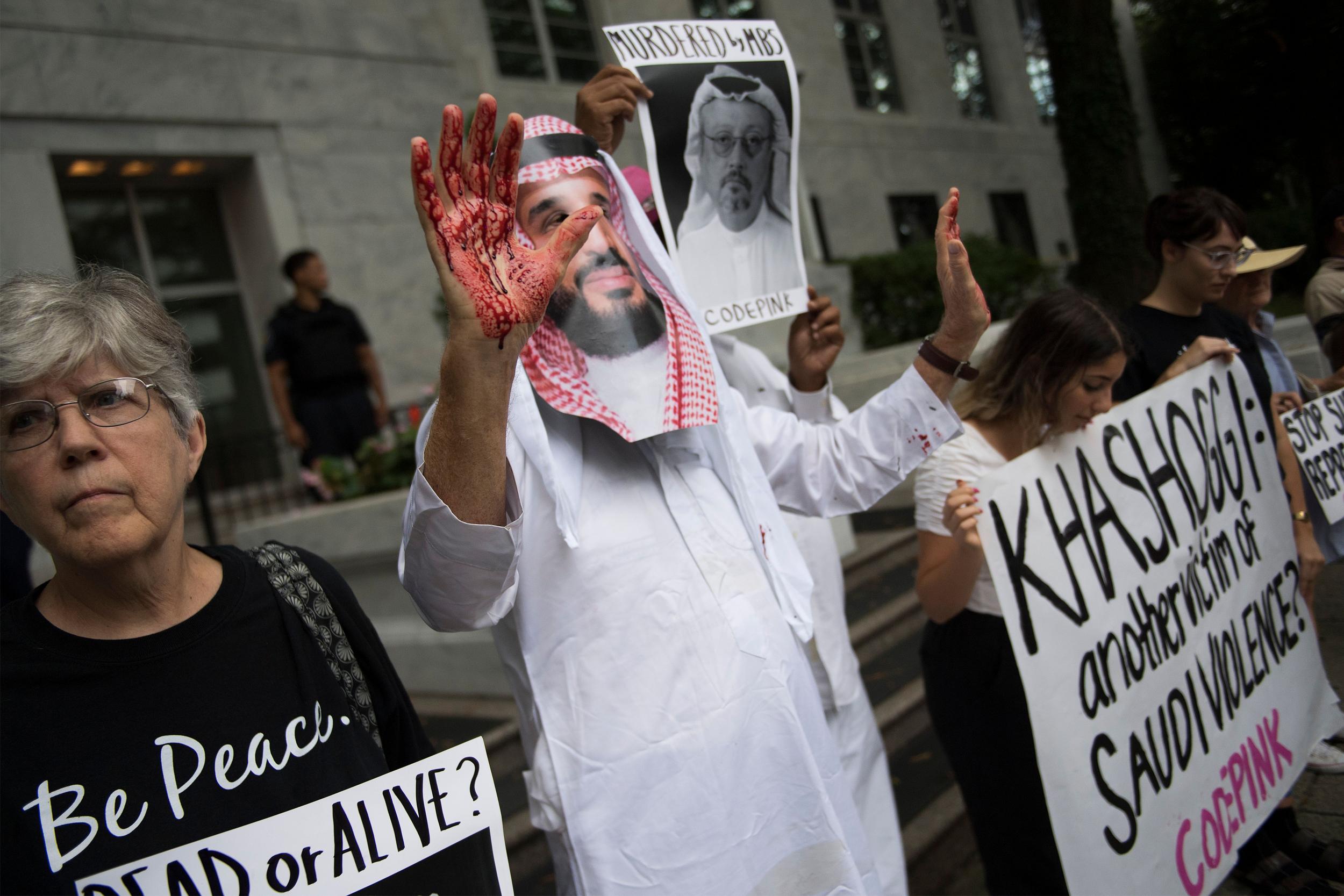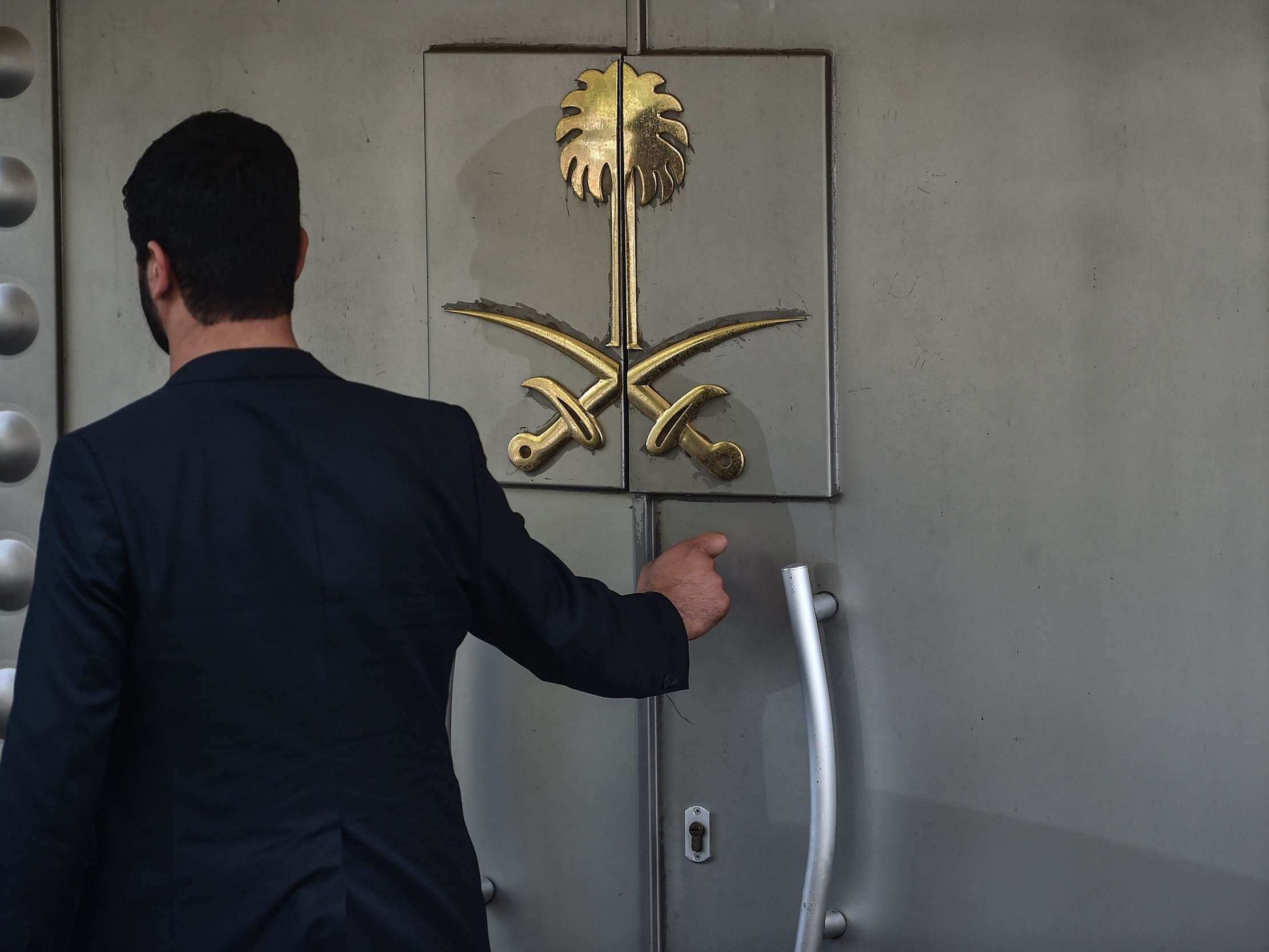The Kingdom of Spin: Saudi Arabia’s PR machine and the murder of Jamal Khashoggi
Saudi Arabia built a PR army to sell Mohammed bin Salman’s reform agenda. And then it helped him rebuild his image after the journalist’s murder, reports Richard Hall

Your support helps us to tell the story
From reproductive rights to climate change to Big Tech, The Independent is on the ground when the story is developing. Whether it's investigating the financials of Elon Musk's pro-Trump PAC or producing our latest documentary, 'The A Word', which shines a light on the American women fighting for reproductive rights, we know how important it is to parse out the facts from the messaging.
At such a critical moment in US history, we need reporters on the ground. Your donation allows us to keep sending journalists to speak to both sides of the story.
The Independent is trusted by Americans across the entire political spectrum. And unlike many other quality news outlets, we choose not to lock Americans out of our reporting and analysis with paywalls. We believe quality journalism should be available to everyone, paid for by those who can afford it.
Your support makes all the difference.The murder of Jamal Khashoggi was supposed to be quiet. The Saudi officials behind the brutal slaying had planned everything meticulously. He would disappear without a trace.
The killers wanted nothing to disturb their boss’s ambitious reform drive at home. The young crown prince, Mohammed bin Salman, was trying to transform his country. He had spent the past two years courting the international community as part of his grand vision to modernise the kingdom and attract foreign investment. He gave Saudis new freedoms, but he also cracked down harder than ever on dissent.
Hundreds of millions of dollars were spent on promoting the crown prince and his reforms. A vast global public relations offensive courted world leaders and celebrities.
And it appeared to be working – up until Khashoggi disappeared. When it emerged that the dissident journalist had been murdered inside the Saudi consulate, likely on behalf of the crown prince, that carefully crafted image was ruined, and the royal found himself in the centre of a global scandal that threatened to derail all of his plans.
An army of public relations firms was now faced with an impossible task: to save the image of a man whom many now regarded as a brutal murderer. One year on from Khashoggi’s killing, they may just have done it.
***
The fallout from the Khashoggi killing was unexpected, but the crown prince’s vast PR network was already on a war footing when the scandal broke.
A year earlier, the Saudi information ministry announced a global campaign “to promote the changing face of KSA to the rest of the world”. This network of lobbyists and public relations experts had been working furiously to counter bad press from Saudi Arabia’s devastating war in Yemen and its blockade of Qatar. Most of it, however, was working to promote the crown prince.
In early 2018, the royal embarked on a high-profile media tour of the US – billed as a coming out party after assuming de-facto leadership of Saudi Arabia from his father. He held meetings with President Donald Trump, Jeff Bezos and Bill Gates, Hollywood stars, Wall Street financiers and Oprah Winfrey, to name a few. He appeared on the flagship news programme 60 Minutes for a sit-down interview, and attracted faint praise from columnists in The New York Times.
That trip was followed by a similarly loud visit to London. PR agencies took out full-page adverts in national newspapers, and paid for giant billboards across the city announcing the visit. Industry insiders said that campaign could have cost as much as £1m.
The spending by the Saudis was on an “immense scale”, says Jonathan Hardy, professor of media and communications at the University of East London. “There was increased funding across a dense network of PR advocacy and lobbying firms working on behalf of Saudi government and strategic interests.”
In 2018, Saudi Arabia spent more than $34m on lobbying in the US alone, according to the Center for Responsive Politics. The kingdom also hired a host of London firms, including Consulum, largely staffed by former employees of Bell Pottinger, and Freuds.
The aim was “to present an image of KSA as striding towards reform, detoxify the government to reduce international political pressure, attract investment for economic growth, and open up foreign tourism”, says Professor Hardy.
But not everyone was convinced. Many saw the PR push as just that, including Khashoggi himself. Nikita Bernardi, a PR consultant who works on human rights cases in the Middle East, remembers discussing the prince’s plans with Khashoggi.
“He and I were having this conversation in the days before his killing,” she says. “Almost exactly a year ago I was in Washington DC organising a conference, the aim of which was to question this new face of Saudi Arabia they were trying to promote. Jamal Khashoggi was one of the speakers.”
“The PR campaign felt so extremely superficial. It was almost designed for western countries that needed him to look more palatable so that they can continue the status quo and sell arms and the rest of it. They needed him to look like he was changing things in the right direction.”

At the very moment Khashoggi was airing his doubts about whether the crown prince was really a true reformer – in private and in public – the royal’s top advisers were plotting to kill the journalist.
Khashoggi went missing on 2 October after entering the Saudi consulate in Istanbul. He had gone there to collect papers so that he could marry his fiancee, who waited for him outside. He was never seen again.
Saudi Arabia initially insisted that Khashoggi had left the consulate, but after a steady stream of leaks by Turkish investigators, it changed the story, saying the 59-year-old was killed there in a “fist fight”.
Turkish and international investigators later said that Khashoggi was murdered inside the consulate and his body disposed of. Agnes Callamard, the UN special rapporteur leading an independent human rights inquiry into the killing, said the murder was “planned and perpetrated by Saudi officials”.
But the trail of evidence led all the way to the crown prince himself. The CIA and some western countries believe the crown prince ordered the killing – something he has continued to deny.
In trying to silence Khashoggi, his murderers had the opposite effect. The journalist’s disappearance sparked a firestorm that engulfed the crown prince. Donald Trump, who had been close to the Saudi royal, described the attempts to deny the killing as the “worst in the history of cover-ups.”
The murder derailed the crown prince’s carefully crafted rebrand. In the weeks that followed, as the crown prince was directly accused of involvement, a number of companies and leaders distanced themselves from the kingdom. London-based Freuds and Pagefield Global Counsel announced they were no longer working with the country, in addition to Milltown Partners, which was run by a former head of communications for Prince Charles.
PR Week reported that Gladstone Place Partners, Glover Park Group, BGR, Portland Communications, and Gibson, Dunn & Crutcher all ended their work for the Saudi government.
But though the kingdom lost much of its PR strength, the firms that stuck around “went into overdrive”, Ben Freeman, who tracks foreign influence for the Centre for International Policy, told The Washington Post.
Those firms included Qorvis Communications, a US-based crisis communications company, and its parent company, MSL, which has worked with the Saudi government for nearly two decades. According to The Washington Post, MSL has received more than $18m from the Saudi government since October 2018.
The Saudi government also signed a new $120,000-a-month contract with Karv Communications earlier this year, according to the Financial Times, to “enhance the reputation and image” of the country’s Public Investment Fund, which is headed by the crown prince.
With the royal under suspicion for the killing, the strategy of the PR firms changed, according to Professor Hardy. The incessant focus on the crown prince was replaced by more targeted persuasion.
“The Saudi government sent out senior envoys to persuade key figures in media, politics and business of the sincerity of the investigation into the killing, and to carry out slow, discrete work to stabilise and rebuild confidence,” he says.
“We are currently seeing a multi-pronged effort. KSA is investing in ‘soft power’ influence such as sports and tourism. Efforts to influence wider public perceptions through such things as sports investment have led to the charge of sportswashing,” he says.
Professor Hardy points to the upcoming boxing rematch between Anthony Joshua and Andy Ruiz for the world heavyweight title that will be held in the kingdom.

On Friday, just days ahead of the anniversary of Khashoggi’s killing, the government announced a new tourist visa programme for 49 countries.
And, one year after Khashoggi’s murder, the crown prince is making a return to the spotlight. On Saturday, he appeared on 60 Minutes again. In the interview, he denied any personal involvement in the killing.
“This was a heinous crime,” he said. “But I take full responsibility as a leader in Saudi Arabia, especially since it was committed by individuals working for the Saudi government.”
“I get all the responsibility, because it happened under my watch,” he said.
Bernardi, the PR consultant, says the interview marks a new strategy.
“There is only so much that could have been done to protect his reputation. The damage was so great. In the whole year since Jamal has died you can see how the Saudi story has changed. First it was deny, deny, deny, then they said it was rogue agents, now we have the crown prince saying ‘it happened under my watch’.”
That is a very PR line. To me that sounds like something that was thought about and rehearsed. It’s just empty words. What are you taking responsibility for? Absolutely nothing
“That is a very PR line. To me that sounds like something that was thought about and rehearsed. It’s just empty words. What are you taking responsibility for? Absolutely nothing.”
Agnes Callamard, the UN’s expert on summary executions whose investigation found “credible evidence” linking the crown prince to the murder, told Reuters that his remarks amount to a “strategy of rehabilitation in the face of public outrage around the world”.
“He is creating a distance between himself, he is exonerating himself from direct criminal responsibility in the killing. He is creating layers, and layers and layers of actors and institutions, which are protecting him from his direct accountability for the killing.”
There are signs, however, that the international community has already moved on from the killing and is perfectly happy to let the crown prince back into the fold. After initially linking the royal to the murder, the Trump administration has made it clear that it would not affect the US-Saudi relationship in any meaningful way.
Next year, Saudi Arabia will host the G20 summit in Riyadh, where the crown prince is likely to take centre stage. But while states will likely continue to do business with Saudi Arabia, it is unlikely that the the royal’s image will ever fully recover.

“MBS [Mohammed bin Salman] has used a wide range of tactics to soften his image in light of the murder, including expensive PR campaigns, publicity stunts and modest social reforms,” says Yahya Assiri, director of ALQST, an organisation that documents and promotes human rights in Saudi Arabia.
“But such attempts have largely been undercut by Saudi Arabia’s ever-worsening human rights record, including the detention and targeting of dissidents, systematic torture, mass executions, and a lack of accountability for Jamal Khashoggi.”
“We have seen increasing international pressure on Saudi Arabia, including two landmark joint statements at the UN, a US house resolution and a UK court ruling.
“While these measures have not always been sufficiently followed up by respective governments, and clearly much further pressure is needed, the time for business as usual is over.”
Join our commenting forum
Join thought-provoking conversations, follow other Independent readers and see their replies
Comments